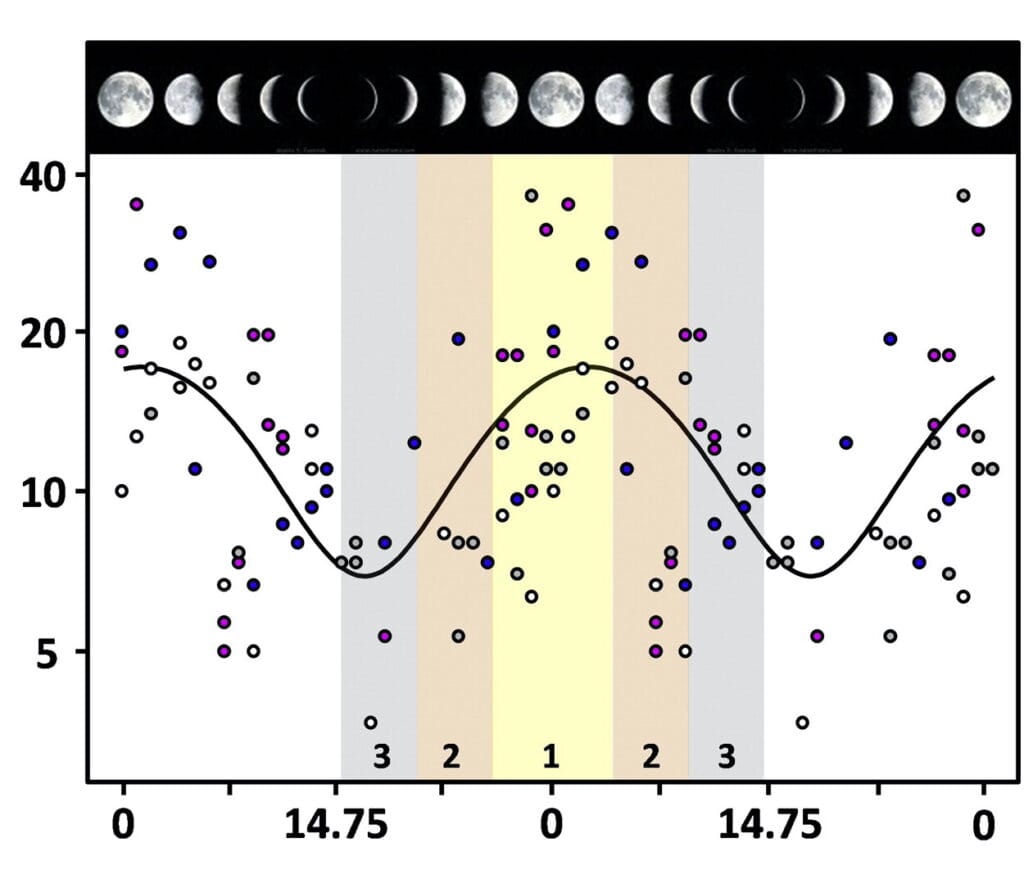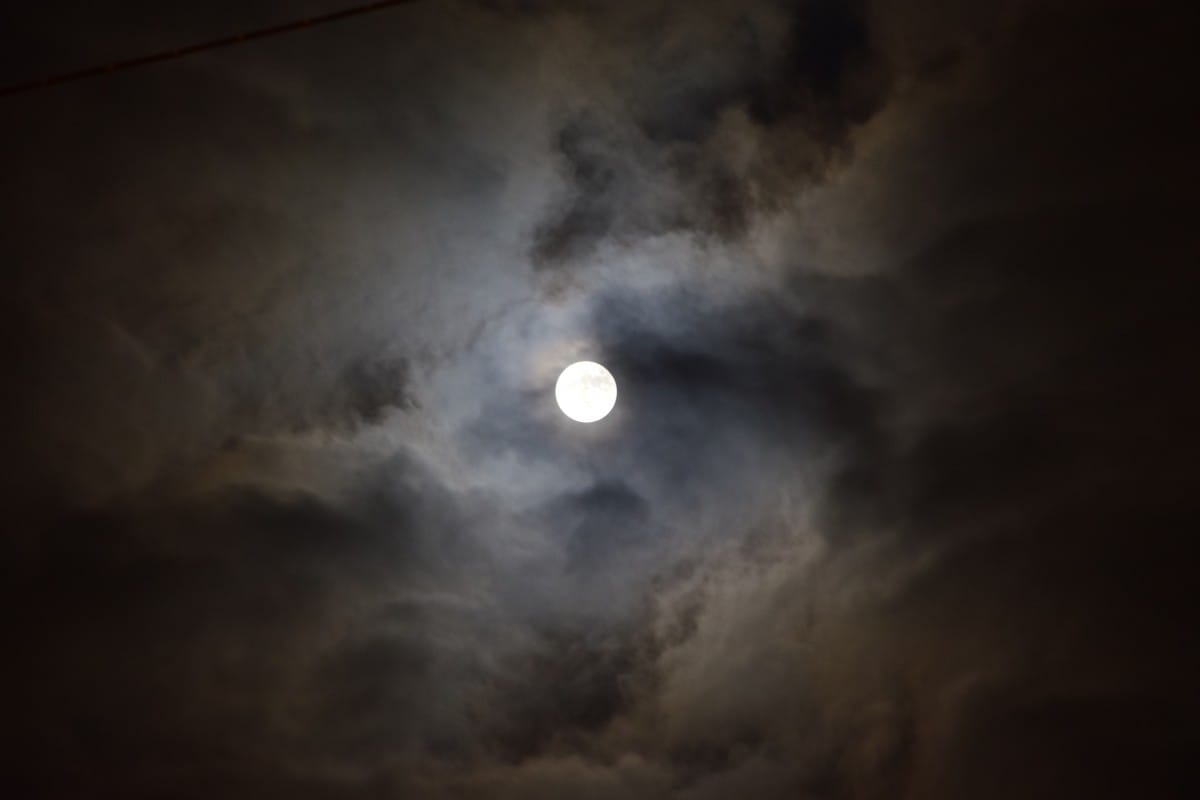There is a belief that during the full moon people go to hospitals (primarily psychiatric ones) more often, fall asleep worse, become more aggressive and suicidal. We decided to check whether this is supported by statistics.
About health threats associated with the influence of moon phases, report not only esoteric projects And yellow press, but also Russian-language news aggregators one of the most different countries, as well as popular women's blogs. In magazines Vogue And L'Officiel You can read not only articles about the influence of the full moon on people’s mood and mental state, but also instructions on how to fall asleep during this phase of the moon. Even some websites dedicated to this topic do not ignore cooking.
Full moon is the phase of the Moon that occurs when the Earth is between the Moon and the Sun. Since our planet's satellite does not emit its own light, but reflects the sun's light, depending on the positions of these three celestial bodies, an observer on Earth will see the reflected light differently. During a full moon, the sun's rays completely illuminate the side of the Moon facing the planet, and therefore it looks like a perfectly round disk glowing brightly in the night sky.
Since ancient times, the full moon has been of great importance to people. It served as a guide in drawing up calendars and helped in planning agricultural work. From the phase of the moon depend also ebbs and flows - changes in water levels in the oceans due to the gravitational attraction of the satellite. The full moon has also been associated with many myths and legends. For example, some believed that during this time werewolves went out hunting and people became more emotional or prone to madness.
In 2017, a group of American scientists analyzed the frequency of exacerbations in 1857 patients of one psychiatric clinic over 17 years of age and the connection of such episodes with the lunar cycle. It turned out that during the full moon there were slightly fewer situations requiring emergency help than during other phases. However, the difference is too small to allow reliable conclusions to be drawn.
In 2019, these observations were confirmed by another group of researchers from the United States. They studied the number of hospitalizations and exacerbations in patients already undergoing treatment over a nearly five-year period. The statistics recorded, in particular, cases of increased aggression and increased agitation. They then compared the collected data with graphs of changes in the phases of the Moon and solar eclipses. It turned out that, contrary to expectations, the frequency of exacerbations decreased during full moons and eclipse periods (but, as in the earlier study, not enough to consider the results significant).
Swiss experts also did not record the effect of the full moon on people’s behavior. In 2019 they studied records of 17,966 admissions to a local psychiatric hospital. According to the researchers' findings, the frequency of hospitalizations during the full moon is no higher than during other periods, and for patients admitted to a health care facility during this phase, the duration of treatment did not exceed that of other patients.
Earlier, in 2005, German psychiatrists compared with moon phases, data on 3,054 suicides and found no pattern between the lunar cycle and suicide rates. The researchers only noted that on moonless nights, men under 40 years of age often prefer to die, for example, by taking poison rather than by shooting themselves. However, this difference, as in most previous cases, was on the verge of statistical error.
Large meta-analyses summarizing the results of individual observations also did not reveal any special influence of the Moon on human behavior. After analyzing 37 published and unpublished studies, the American Psychological Association not found patterns between the phase of the lunar cycle and the frequency of mental exacerbations requiring hospitalization, suicide, murder and other violent crimes. Canadian scientists turned on Our sample included 20 studies on completed suicides, unsuccessful attempts to die, and threats to do so. They also did not find any connection with the lunar cycle.
However, in 2019, an unusual case was described in the United States: a 67-year-old patient with bipolar affective disorder had alternating episodes (manic/hypomanic and depressive). synchronized with the lunar cycle while taking a certain lithium drug and increased levels of thyroid-stimulating hormone. After changing the drug, normalizing the hormone level and a course of light therapy, the connection with the phases of the moon also disappeared. Scientists have found it difficult to explain the nature of such a coincidence.
In 2019, Simo Näihä, a scientist from the Finnish University of Oulu, studied, whether the phases of the moon can affect the frequency of murders. He analyzed 6,808 such crimes committed between 1961 and 2014 and found that the number of murders during a full moon was 15% lower than during a new moon, and the difference between the number of murders in the lightest and darkest quartiles of the cycle was as much as 86%. The scientist did not explain this pattern. However, it can be assumed that the activity of criminals is not related to the mysterious influence of the satellite, but to the level of illumination - the higher it is at night, the more difficult it is to attack unnoticed. In 1999, scientists from the University of California nominated hypothesis that before the advent of modern lighting, the Moon was the main source of light at night and thereby influenced the sleep-wake cycle, typically causing sleep deprivation during the full moon. It may, in turn, contribute to exacerbation of mania/hypomania in susceptible patients with bipolar disorder and seizures in patients with seizure disorders. Researchers have suggested that this is what formed the basis for the belief about the connection between the full moon and mental disorders. True, testing this hypothesis in the conditions of modern artificial night lighting is extremely problematic.
However, in 2021, such an attempt was made by a team of scientists from the USA and Argentina. They compared the quality and duration of night sleep among Americans in large cities and representatives of the South American Toba people living without access to electricity. On moonlit nights, both study groups fell asleep later and slept less. Similar data received and Swiss researchers who conducted an experiment involving 33 volunteers. The participants did not know that scientists were interested in the effect of moonlight on the quality of sleep, and in order to negate the effect of illumination, the volunteers spent their nights in a special room completely isolated from light. The researchers recorded the time required to fall asleep, the duration of sleep and its quality (more precisely, the duration deep sleep). On full moon days, participants fell asleep for 5 minutes. longer, slept for 20 minutes. less, and the deep sleep phase was reduced by 30%.

Otherwise, as studies show, the full moon has little effect on a person. Although there is beliefthat childbirth occurs more often during the full moon, scientific data does not confirm this. Francisco Marco-Garcia, historian from South Africa, analyzed data on 23,689 births from 1810 to 1929, during which period there were 1,484 lunar cycles. It turned out that the same number of births occurred on full moon days as during other phases of the moon. A more recent array of data was provided by Japanese scientists - they considered records from 1996–2007 at a hospital in Fukuoka Prefecture in the south of the country. In total, the study used statistics on 1,507 births; the authors excluded premature babies and induced labor from the sample. Scientists did not find a connection between the frequency of births and the lunar cycle, but noted that on the full moon, as well as the days preceding and following it, children were more often born in the evening and at night, and on the new moon - during the day. Researchers suggest that, evolutionarily, the human body has adapted to the level of lighting and spontaneous births more often occur when there is enough light, that is, on moonlit nights or during the day.
Available scientific evidence suggests that nursing home residents suffer from excitement during the full moon is even slightly less common than during other phases of the lunar cycle, although this difference is not statistically significant. At this time No a surge in requests for psychological help due to anxiety or depression. Road traffic accidents like show research does not happen more often during a full moon. During this phase of the Moon, people are no more likely to are exposed attacks with the use of blunt or piercing objects, as well as firearms, than in others. Not recorded and an increase in the number of visits to medical attention due to dog bites, and an increase in cases of overdose narcotic drugs.
Thus, although studies show that people sleep slightly worse during a full moon, it has little effect on other aspects of life. Scientists have not recorded a connection between the phases of the moon and depression, anxiety or aggression, the frequency of murders and other violent crimes, road accidents, suicides and overdoses. People with a mental diagnosis during the full moon do not become more susceptible to exacerbations, and if they end up in hospitals at this time, they spend the same amount of time there as patients who required hospitalization during other phases of the lunar cycle.
Cover image: PxHere
If you find a spelling or grammatical error, please let us know by highlighting the error text and clicking Ctrl+Enter.






